
Kartik Budhiraja and his Build Stream team of hackers accept the first-prize cheque following the Oxford Properties Global Hackathon Sept. 14-15 in Toronto. (Kelly Roche RENX)
Kartik Budhiraja enjoys participating in hackathons. However, the 21-year-old Seneca College computer programming and analysis student wasn’t expecting his team to win the grand prize at the Oxford Properties’ Global Hackathon in Toronto during the weekend.
“It’s been a long time coming,” said an emotional Budhiraja after taking top spot and the US$3,000 cheque that goes with it.
It was “a special experience,” he said, since he put together a team called Build Stream with five of his friends. None of the other had met each other prior to the weekend.
Raisa Sayed, Abbas Rattansi, Sukhy Dhami, Jishnu Kidile and Abhinav Medha, got acquainted quickly, creating an interface for Oxford “to get user feedback on the products they use in their buildings,” said Budhiraja.
The interface allows for the creation of QR codes unique to individual products.
“Humans, we can skip giving positive feedback, but we’ll never skip giving negative feedback,” Budhiraja noted, “and we made it easy.”
Oxford Properties is a global real estate owner, investor, developer and property management company headquartered in downtown Toronto. It is the real estate arm of OMERS, the Ontario Municipal Employees’ Retirement System.
Hackathons in Boston, London, Sydney
Budhiraja and his friends were among 400 who gathered in four major cities — including Boston, London and Sydney — all weekend to develop solutions for some of the most pressing challenges in the sector.
“We decided that we wanted to engage the entrepreneurial community around sort of the development process — construction, design, because it’s really been the same for about 100 years,” said Oxford’s chief operations officer Dean Hopkins.
Despite leaps in technology, Hopkins doesn’t feel there have been major leaps forward within the industry.
“We have quite a lot of square footage around the world,” he said. “Wouldn’t it be great if we could start harnessing some of the creative energy that’s out there?”
Participants were tasked with tackling the development process, either with a new building or building out an existing environment.
Three CRE-related problems
They examined three problems:
* running the design process more efficiently;
* lean versus agile methods in software;
* and capturing data in more interesting ways, or using it in the design process.
The challenge was issued Friday evening and participants spent Saturday and Sunday grinding it out to build solutions. Mentors were brought in to offer feedback and pitch practices were held.
“So they get something out of it, they actually build some entrepreneurial muscles out of it,” said Hopkins.
While hackathons are stereotypically male-dominated, diversity — gender and ethnic — was an important aspect of this event.
“What we’ve seen in Toronto over the last five years is a really strong growth in female entrepreneurship,” said Hopkins, adding plenty of work has been put in “to make it a more welcoming environment” for women.
Natasha Gibe, 26, is one of them.
“I just was looking for things to do this weekend,” said Gibe, who texted partner Derek Jones, 28, and he was in. “Then it turned out pretty fun.”
Fun and profitable. They ended up finishing third and earning a US$500 cheque for their web application, which offers recommendations for cost approvals and procurement using artificial intelligence.
Their presentation illustrated to the judging panel how data might be used for future purchases for their properties, such as mirrors or shower heads.
Five-member judging panel
The top-six solutions were narrowed down with each team making a five-minute pitch to a full house of observers.
The finale judges were Oxford Properties director of development Veronica Maggisano, Altus Group CEO Bob Courteau, Oxford Properties VP of development Carlo Timpano, R-Labs founder and CEO George Carras, and Hariri Pontarini Architects partner Siamak Hariri.
It was not just students taking part. A team from PCL Construction was also on hand.
“That encourages us, to understand what our partners are doing, so (it’s) not just random entrepreneurs,” said Hopkins. “We’re actually seeing some industry partners, which is quite good.”
Commercial real estate is undergoing a major transformation and “it’s one of the undisrupted industries digitally,” he added.
Disrupt, or be disrupted
With trillions of dollars being spent within the industry, “entrepreneurs are coming around, they’re thinking ‘Wait a minute, we need to disrupt this industry. We need to bring some new technology to it.’ And that’s resulted in 10s of billions of dollars of investments.”
At the end of the day, “we’ve gotta pay attention,” said Hopkins. “We don’t want to be the disrupted. We’d like to be the disruptor . . . why not be out at the forefront of this?”
Data-driven decision-making was one theme which caught Hopkins’ eye during the top six presentations.
“I particularly liked the recommendation engine,” he said. “I think there was a lot to think about and chew on.
“We’re a big believer that data has to be part of the strategy going forward, so it was nice to see that reaffirmed.”







